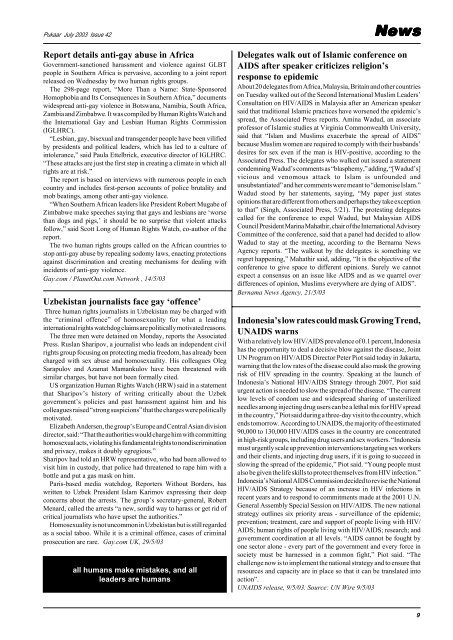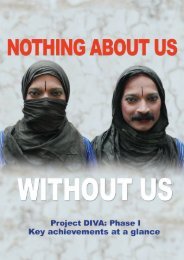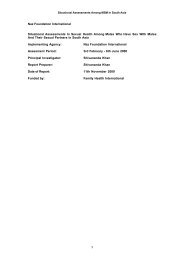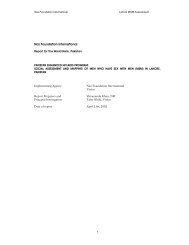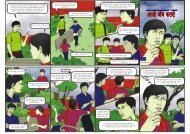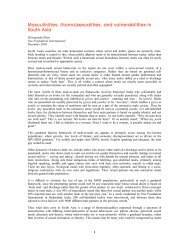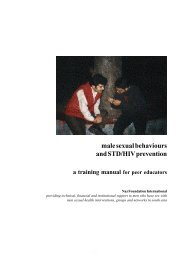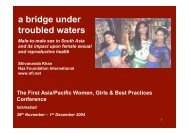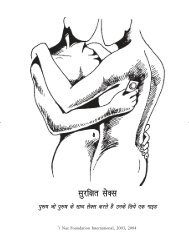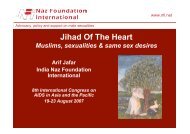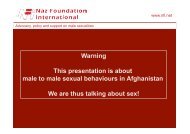Features - Naz Foundation International
Features - Naz Foundation International
Features - Naz Foundation International
Create successful ePaper yourself
Turn your PDF publications into a flip-book with our unique Google optimized e-Paper software.
Pukaar July 2003 Issue 42<br />
Report details anti-gay abuse in Africa<br />
Government-sanctioned harassment and violence against GLBT<br />
people in Southern Africa is pervasive, according to a joint report<br />
released on Wednesday by two human rights groups.<br />
The 298-page report, “More Than a Name: State-Sponsored<br />
Homophobia and Its Consequences in Southern Africa,” documents<br />
widespread anti-gay violence in Botswana, Namibia, South Africa,<br />
Zambia and Zimbabwe. It was compiled by Human Rights Watch and<br />
the <strong>International</strong> Gay and Lesbian Human Rights Commission<br />
(IGLHRC).<br />
“Lesbian, gay, bisexual and transgender people have been vilified<br />
by presidents and political leaders, which has led to a culture of<br />
intolerance,” said Paula Ettelbrick, executive director of IGLHRC.<br />
“These attacks are just the first step in creating a climate in which all<br />
rights are at risk.”<br />
The report is based on interviews with numerous people in each<br />
country and includes first-person accounts of police brutality and<br />
mob beatings, among other anti-gay violence.<br />
“When Southern African leaders like President Robert Mugabe of<br />
Zimbabwe make speeches saying that gays and lesbians are ‘worse<br />
than dogs and pigs,’ it should be no surprise that violent attacks<br />
follow,” said Scott Long of Human Rights Watch, co-author of the<br />
report.<br />
The two human rights groups called on the African countries to<br />
stop anti-gay abuse by repealing sodomy laws, enacting protections<br />
against discrimination and creating mechanisms for dealing with<br />
incidents of anti-gay violence.<br />
Gay.com / PlanetOut.com Network , 14/5/03<br />
Uzbekistan journalists face gay ‘offence’<br />
Three human rights journalists in Uzbekistan may be charged with<br />
the “criminal offence” of homosexuality for what a leading<br />
international rights watchdog claims are politically motivated reasons.<br />
The three men were detained on Monday, reports the Associated<br />
Press. Ruslan Sharipov, a journalist who leads an independent civil<br />
rights group focusing on protecting media freedom, has already been<br />
charged with sex abuse and homosexuality. His colleagues Oleg<br />
Sarapulov and Azamat Mamankulov have been threatened with<br />
similar charges, but have not been formally cited.<br />
US organization Human Rights Watch (HRW) said in a statement<br />
that Sharipov’s history of writing critically about the Uzbek<br />
government’s policies and past harassment against him and his<br />
colleagues raised “strong suspicions” that the charges were politically<br />
motivated.<br />
Elizabeth Andersen, the group’s Europe and Central Asian division<br />
director, said: “That the authorities would charge him with committing<br />
homosexual acts, violating his fundamental rights to nondiscrimination<br />
and privacy, makes it doubly egregious.”<br />
Sharipov had told an HRW representative, who had been allowed to<br />
visit him in custody, that police had threatened to rape him with a<br />
bottle and put a gas mask on him.<br />
Paris-based media watchdog, Reporters Without Borders, has<br />
written to Uzbek President Islam Karimov expressing their deep<br />
concerns about the arrests. The group’s secretary-general, Robert<br />
Menard, called the arrests “a new, sordid way to harass or get rid of<br />
critical journalists who have upset the authorities.”<br />
Homosexuality is not uncommon in Uzbekistan but is still regarded<br />
as a social taboo. While it is a criminal offence, cases of criminal<br />
prosecution are rare. Gay.com UK, 29/5/03<br />
all humans make mistakes, and all<br />
leaders are humans<br />
News<br />
Delegates walk out of Islamic conference on<br />
AIDS after speaker criticizes religion’s<br />
response to epidemic<br />
About 20 delegates from Africa, Malaysia, Britain and other countries<br />
on Tuesday walked out of the Second <strong>International</strong> Muslim Leaders’<br />
Consultation on HIV/AIDS in Malaysia after an American speaker<br />
said that traditional Islamic practices have worsened the epidemic’s<br />
spread, the Associated Press reports. Amina Wadud, an associate<br />
professor of Islamic studies at Virginia Commonwealth University,<br />
said that “Islam and Muslims exacerbate the spread of AIDS”<br />
because Muslim women are required to comply with their husbands’<br />
desires for sex even if the man is HIV-positive, according to the<br />
Associated Press. The delegates who walked out issued a statement<br />
condemning Wadud’s comments as “blasphemy,” adding, “[Wadud’s]<br />
vicious and venomous attack to Islam is unfounded and<br />
unsubstantiated” and her comments were meant to “demonise Islam.”<br />
Wadud stood by her statements, saying, “My paper just states<br />
opinions that are different from others and perhaps they take exception<br />
to that” (Singh, Associated Press, 5/21). The protesting delegates<br />
called for the conference to expel Wadud, but Malaysian AIDS<br />
Council President Marina Mahathir, chair of the <strong>International</strong> Advisory<br />
Committee of the conference, said that a panel had decided to allow<br />
Wadud to stay at the meeting, according to the Bernama News<br />
Agency reports. “The walkout by the delegates is something we<br />
regret happening,” Mahathir said, adding, “It is the objective of the<br />
conference to give space to different opinions. Surely we cannot<br />
expect a consensus on an issue like AIDS and as we quarrel over<br />
differences of opinion, Muslims everywhere are dying of AIDS”.<br />
Bernama News Agency, 21/5/03<br />
Indonesia’s low rates could mask Growing Trend,<br />
UNAIDS warns<br />
With a relatively low HIV/AIDS prevalence of 0.1 percent, Indonesia<br />
has the opportunity to deal a decisive blow against the disease, Joint<br />
UN Program on HIV/AIDS Director Peter Piot said today in Jakarta,<br />
warning that the low rates of the disease could also mask the growing<br />
risk of HIV spreading in the country. Speaking at the launch of<br />
Indonesia’s National HIV/AIDS Strategy through 2007, Piot said<br />
urgent action is needed to slow the spread of the disease. “The current<br />
low levels of condom use and widespread sharing of unsterilized<br />
needles among injecting drug users can be a lethal mix for HIV spread<br />
in the country,” Piot said during a three-day visit to the country, which<br />
ends tomorrow. According to UNAIDS, the majority of the estimated<br />
90,000 to 130,000 HIV/AIDS cases in the country are concentrated<br />
in high-risk groups, including drug users and sex workers. “Indonesia<br />
must urgently scale up prevention interventions targeting sex workers<br />
and their clients, and injecting drug users, if it is going to succeed in<br />
slowing the spread of the epidemic,” Piot said. “Young people must<br />
also be given the life skills to protect themselves from HIV infection.”<br />
Indonesia’s National AIDS Commission decided to revise the National<br />
HIV/AIDS Strategy because of an increase in HIV infections in<br />
recent years and to respond to commitments made at the 2001 U.N.<br />
General Assembly Special Session on HIV/AIDS. The new national<br />
strategy outlines six priority areas - surveillance of the epidemic;<br />
prevention; treatment, care and support of people living with HIV/<br />
AIDS; human rights of people living with HIV/AIDS; research; and<br />
government coordination at all levels. “AIDS cannot be fought by<br />
one sector alone - every part of the government and every force in<br />
society must be harnessed in a common fight,” Piot said. “The<br />
challenge now is to implement the national strategy and to ensure that<br />
resources and capacity are in place so that it can be translated into<br />
action”.<br />
UNAIDS release, 9/5/03. Source: UN Wire 9/5/03<br />
9


